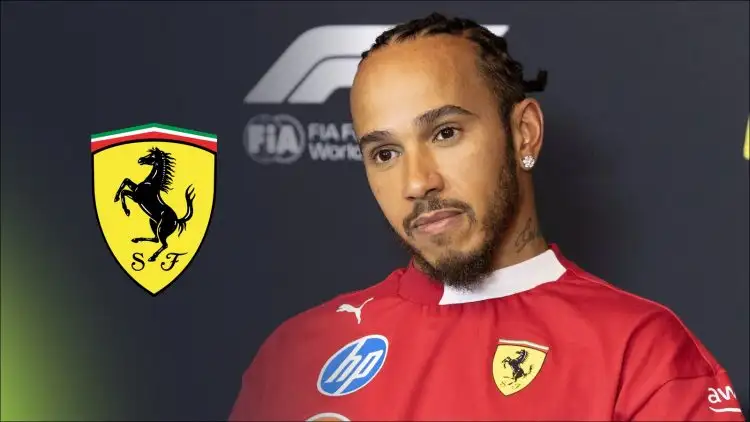Lewis Hamilton and Ferrari ‘Conflict’ Emerges as Guenther Steiner H… read
In what was hailed as a blockbuster move for Formula 1, seven-time World Champion Lewis Hamilton’s switch from Mercedes to Ferrari for the 2025 season came with enormous fanfare and expectations. Ferrari, the most iconic team in the history of the sport, joined forces with the most successful and most recognized driver of the modern era—a combination that promised a powerful resurgence. Yet, just halfway into the season, there is growing speculation about the compatibility of the two colossal brands. Former F1 team boss Guenther Steiner has now waded into the conversation, suggesting that a subtle “conflict” exists between Hamilton’s individual brand and the long-established Ferrari identity.
Speaking on the Business of Sport podcast, Steiner offered a striking perspective: Hamilton is perhaps the only Formula 1 driver whose brand power eclipses that of the team he drives for. According to Steiner, this dynamic can create internal tensions, especially in a setting like Ferrari where the brand’s heritage, prestige, and traditional values are fiercely guarded. “I think in Formula 1, the only one above a team is Lewis Hamilton,” Steiner remarked. “His presence, his stature—it is very big. Outside of the sport as well. You’re big in the sport, but then when you get big outside of the sport, you’re bigger than the actual team.”
Hamilton’s influence certainly extends far beyond the racetrack. His ventures into fashion, film production, activism, and philanthropy have made him a global cultural figure. This makes his public image more complex and potent than perhaps any other F1 driver in history. Steiner made a sharp distinction between Hamilton and reigning World Champion Max Verstappen, stating that while Verstappen is undoubtedly one of the greatest in the sport today, he does not cultivate a presence beyond racing. “Max is very big in the sport, but he doesn’t work on being somebody outside of the sport. For him, his life is racing cars, while Lewis has got another thing as well—what he wants to achieve in life.”
That clash of philosophies, according to Steiner, could be at the heart of the current struggles Hamilton and Ferrari are experiencing. Despite the anticipation that accompanied Hamilton’s arrival at Maranello, the results so far have been underwhelming. Hamilton has yet to score a single podium finish in the first half of the season, while his teammate Charles Leclerc has managed to reach the podium four times. Ferrari, though historically dominant, has been plagued by inconsistent performances and car development issues in recent years—and 2025 has proven no different.
Hamilton himself has been candid about the challenges he’s faced since joining Ferrari. After a wet and frustrating British Grand Prix at Silverstone, where he finished fourth, Hamilton didn’t mince words in his post-race analysis. “It was the most difficult car I’ve driven here,” he stated bluntly. “It’s only my second time driving in the wet in this car and I can’t even express to you how hard it is. It’s not a car that likes those conditions, but lots of data to take from this. I might have to sit down with the people that are designing the car for next year because there’s elements of this car that cannot go into the following year.”
That kind of honesty from Hamilton is not new, but in the Ferrari environment—where discretion and internal solidarity are often prized—it has stood out. Furthermore, his relationship with Ferrari race engineer Riccardo Adami has come under scrutiny due to a number of terse radio exchanges during races, which have pointed to deeper communication issues within the team.
For a team like Ferrari, whose legacy is built on tradition, loyalty, and unity, Hamilton’s larger-than-life brand can feel like both an asset and a challenge. The team wants success and is undoubtedly proud to have a driver of Hamilton’s caliber and popularity. But they must also navigate the complexities that come with his global image, his demand for innovation, and his candid approach to feedback. In contrast, Ferrari’s corporate culture has historically leaned toward protecting its internal dynamics and controlling its narrative—a philosophy that doesn’t always align seamlessly with Hamilton’s modern, media-savvy persona.
Ultimately, both Hamilton and Ferrari are navigating uncharted territory. While their alliance holds enormous potential to reignite Ferrari’s championship hopes and solidify Hamilton’s legacy with an eighth world title, the road ahead requires delicate balancing. Steiner’s comments may prove prophetic if the Ferrari-Hamilton partnership fails to find the harmony it needs to translate star power into consistent race-winning performance. Two of motorsport’s biggest names are sharing the same stage—but whether they can perform in sync remains the pressing question of the 2025 season.




